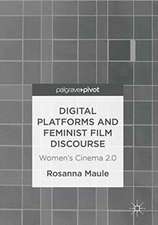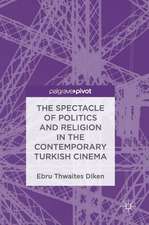A Post-Nationalist History of Television in Ireland
Autor Edward Brennanen Limba Engleză Hardback – 7 feb 2019
Preț: 589.14 lei
Preț vechi: 693.12 lei
-15% Nou
Puncte Express: 884
Preț estimativ în valută:
112.73€ • 118.02$ • 93.28£
112.73€ • 118.02$ • 93.28£
Carte tipărită la comandă
Livrare economică 05-19 aprilie
Preluare comenzi: 021 569.72.76
Specificații
ISBN-13: 9783319968599
ISBN-10: 3319968599
Pagini: 231
Ilustrații: XV, 235 p. 9 illus., 6 illus. in color.
Dimensiuni: 148 x 210 x 21 mm
Greutate: 0.56 kg
Ediția:1st ed. 2019
Editura: Springer International Publishing
Colecția Palgrave Macmillan
Locul publicării:Cham, Switzerland
ISBN-10: 3319968599
Pagini: 231
Ilustrații: XV, 235 p. 9 illus., 6 illus. in color.
Dimensiuni: 148 x 210 x 21 mm
Greutate: 0.56 kg
Ediția:1st ed. 2019
Editura: Springer International Publishing
Colecția Palgrave Macmillan
Locul publicării:Cham, Switzerland
Cuprins
1. How Should We Write a History of Television?.- 2. A Dominant Narrative in Irish Television History.- 3. Personal Memory and Social Power.- 4. Making Sense of Television.- 5. Memories of Imported Programmes and International Broadcasts.- 6. Time, Space and Television.- 7. Recollection and Social Status.- 8. Putting the Bishop and the Nightie to Bed.- 9. Personally Remembering the Global.
Recenzii
“A Post Nationalist History of Television in Ireland makes a valuable addition to current research and enhances our understanding of the relationship between television, the global and social change in an Irish context. While the volume could be of obvious benefit to academics in media studies, history and sociology to name but a few, Brennan’s discussion may also prove of interest to those with a general interest in social change in Ireland or the impact of television on Irish society.” (Stephen Goulding, Estudios Irlandeses, Issue 15, 2020)
Notă biografică
Edward Brennan is a lecturer at the Technological University Dublin, Ireland.
Textul de pe ultima copertă
This book explores the question of how society has changed with the introduction of private screens. Taking the history of television in Ireland as a case study due to its position at the intersection of British and American media influences, this work argues that, internationally, the transnational nature of television has been obscured by a reliance on institutional historical sources. This has, in turn, muted the diversity of audience experiences in terms of class, gender and geography. By shifting the focus away from the default national lens and instead turning to audience memories as a key source, A Post-Nationalist History of Television in Ireland defies the notion of a homogenous national television experience and embraces the diverse and transnational nature of watching television. Turning to people’s memories of past media, this study ultimately suggests that the arrival of the television in Ireland, and elsewhere, was part of a long-term, incremental changewhere the domestic and the intimate became increasingly fused with the global.
Caracteristici
Merges previously separate aspects of media history to offer a new perspective on how media history is written and how social hierarchy affects memory Combines media theory, memory research and social history to reconsider the role of television in social change Offers a local history with international relevance

















